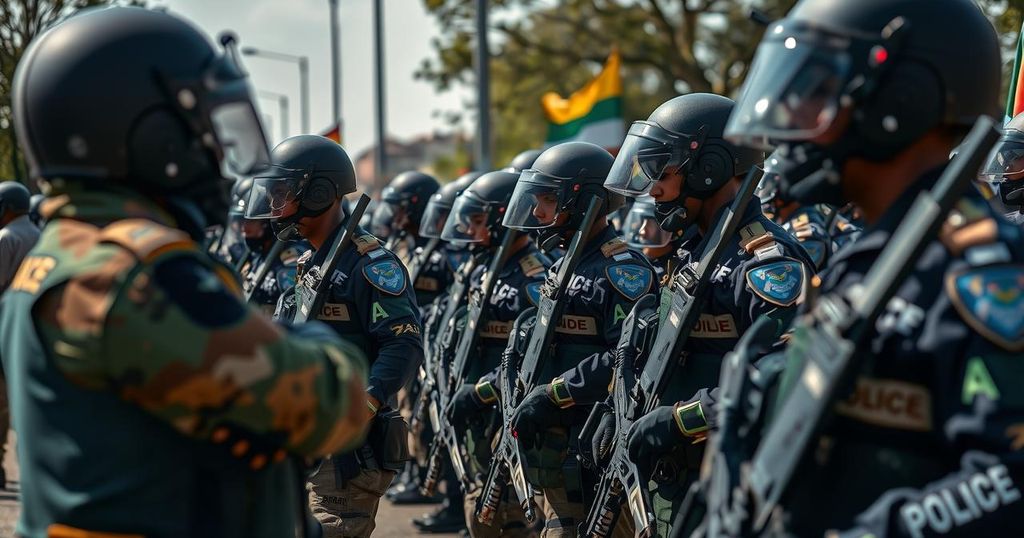Opposition activists in Botswana attempted to protest against alleged foreign interference in the upcoming elections but were obstructed by police. Claims of Zimbabwe’s involvement to aid the ruling BDP have surfaced. The situation raises concerns about police neutrality and electoral integrity as the elections near.
In Botswana, opposition activists assembled in the capital city of Gaborone prior to the forthcoming general elections scheduled for Wednesday. Their objective was to deliver a petition to the embassy of Zimbabwe, expressing concerns about alleged interference from Zimbabwe to bolster the ruling Botswana Democratic Party’s (BDP) prolonged reign since 1966. The opposition coalition, the Umbrella for Democratic Change (UDC), sought to bring attention to what they perceive as a conspiracy aiming to facilitate electoral manipulation. However, the protest was met with significant resistance from law enforcement authorities. Heavily armed police officers utilized shields, batons, and firearms to obstruct the demonstrators and barricaded key roads to prevent the marchers from reaching their intended destination. Despite the disruption, UDC representative Phenyo Butale managed to present the petition to an audience, denouncing any Zimbabwean involvement in Botswana’s electoral affairs. There exist claims from the UDC that reliable information indicates that the Zimbabwean government intends to aid the BDP in manipulating the election results. President Mokgweetsi Masisi, who is pursuing a second term, is currently contesting against three challengers. Butale articulated their concerns in an interview, stating, “We decided to march to the Zimbabwe Embassy because we have been receiving credible information that there is an attempt by the Zimbabwean government to assist their friends here, the ruling party in Botswana, through clandestine means.” He critiqued the police’s actions, asserting that they should not have obstructed their right to protest and that their interpretation of the law was to facilitate rather than restrict freedom of expression. Police officials contended that demonstrators are required to secure a permit for any gatherings. Political analyst Zibani Maundeni indicated that such actions from the police could be perceived as politically motivated, stating, “The police have to be a neutral body. If people organize a peaceful demonstration, there is no reason it should be stopped.” The ruling BDP vehemently refuted allegations regarding any collusion with Zimbabwe’s ruling ZANU-PF party, with a spokesperson from ZANU-PF categorically denying interference in Botswana’s electoral matters and deeming the allegations as unfounded. Furthermore, the administration has faced scrutiny over the early voting process, with reports of ballot paper shortages at several polling stations. President Masisi, who succeeded former President Ian Khama as Vice President in 2018 and was subsequently elected to a five-year term in 2019, finds himself under pressure as the electoral process unfolds, amid accusations of undue influence from a neighboring country and operational inefficiencies within the voting system.
The current political atmosphere in Botswana reflects longstanding tensions between the ruling Botswana Democratic Party (BDP) and various opposition groups. The BDP has held power since 1966, leading to widespread allegations of electoral malfeasance. The opposition coalition, known as the Umbrella for Democratic Change (UDC), has emerged as a vocal critic of the ruling party, particularly in light of impending general elections. Allegations have surfaced suggesting foreign interference from Zimbabwe could be aiding the BDP’s electoral efforts, which adds another layer of complexity to the political landscape. This situation unfolds against a backdrop of broader regional dynamics, where the police’s role during elections is under scrutiny and often viewed as biased toward ruling parties, complicating the public’s trust in democratic processes.
The recent protests by opposition activists in Botswana highlight significant concerns regarding potential election interference and the role of law enforcement in maintaining democratic rights. The resistance faced by demonstrators has raised questions regarding the neutrality of police actions during politically charged events. Given the context of long-standing political dominance by the BDP and allegations of external influence, the upcoming elections appear to be a critical juncture for Botswana’s political future. It remains to be seen how these dynamics will play out as the election approaches and whether the concerns of opposition groups will be addressed adequately.
Original Source: www.voanews.com






